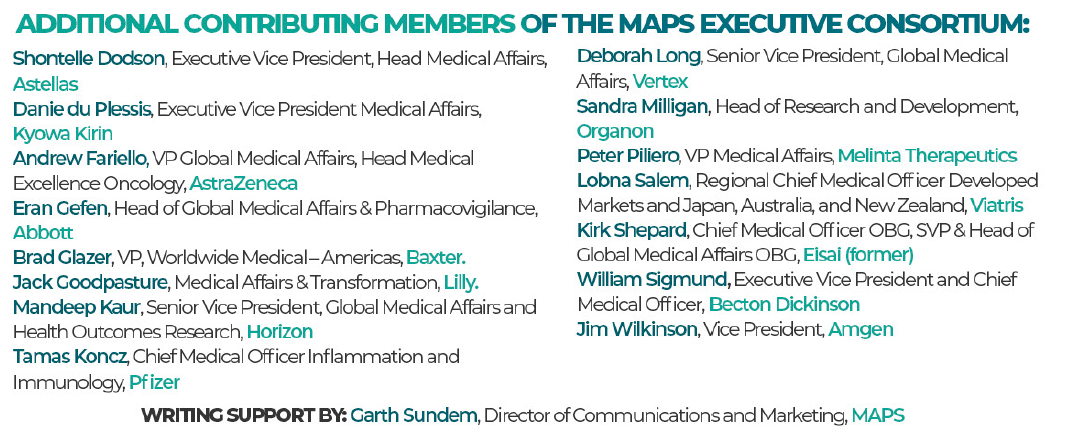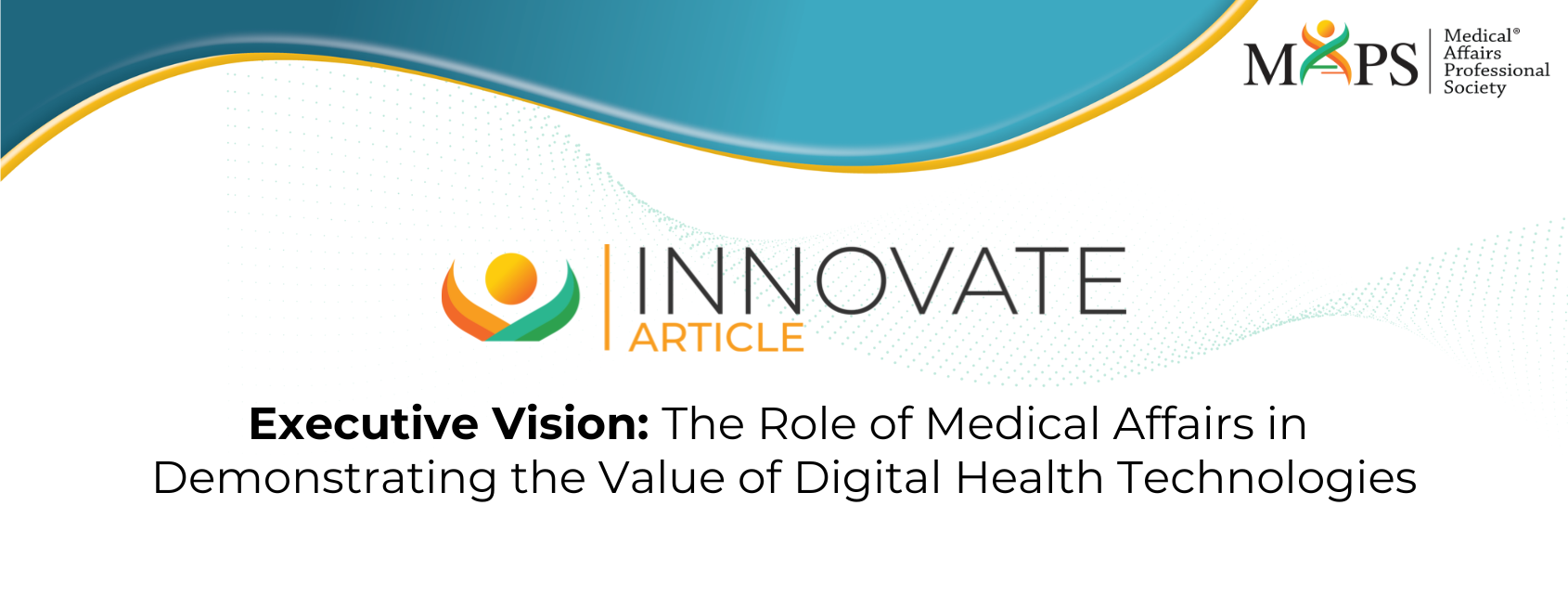Executive Vision: The Role of Medical Affairs in Demonstrating the Value of Digital Health Technologies

Introduction
As the science and technology underpinning pharmaceutical and MedTech innovations continue to advance, clinical practice is becoming increasingly nuanced and complex. Meanwhile, the volume of data generated in healthcare settings expands dramatically, leading to the ability to more precisely understand and treat disease states and improve outcomes in patients at an individual and population level. This combined impact of treatment complexity and data availability highlights the value of Medical Affairs departments that have the capability to make clinical sense of new disruptive drugs, devices, real-time monitoring and diagnostics. However, even with this sea change, the core mission of Medical Affairs remains unchanged: to ensure patients benefit from emerging health technology innovation. The following are ways Medical Affairs departments, teams and individuals can help healthcare providers and industry address the challenges and optimize the opportunities of rapid technological and scientific advancement to maximize patient health outcomes.
3 Ways Health Technologies Benefit Patients
Broadly speaking, new science and technology are powering patient benefit in three ways:
- Directly, through technology-enhanced treatments and new classes of therapeutic options
- Indirectly, through a more complete understanding of population, subpopulation and individual outcomes based on data generation and analysis
- Through technology-driven communications that empower HCPs to optimize treatment recommendations and allow patients to make informed decisions (and take timely action) regarding their own care
An example of the first two benefits can be seen in digital inhaler technologies, which both enhance the direct benefit to the patient using the inhaler and allow the collection, aggregation and analysis in real time of data based on inhaler use to provide recommendations to enhance benefits at the patient and population level. The third aspect of patient benefit may be seen, for example, in predictive analytics that can facilitate early medical intervention in a deteriorating patient before a critical event occurs. In this context, and as the volume of patient data increases, Medical Affairs is uniquely positioned to ensure industry remains focused on individual patients as people and on patients’ real-world needs.
Communicating Value
The impact of health technologies depends on access – and access depends on defining and communicating the value of these technologies. Reimbursement agencies weigh patient benefit against cost; Medical Affairs Evidence Generation groups (and especially groups working with Real World Evidence) will play an increasingly important role in demonstrating patient benefit from novel therapeutic options such as technology-enhanced therapeutics and new classes of therapeutics. The ability to holistically measure these benefits and their relative value in the healthcare space requires Medical Affairs to work seamlessly with or integrate disciplines such as health economics and outcomes research (HEOR), and epidemiology. Opportunities for enhanced data generation need to be identified and formalized in the Integrated Evidence Generation Plan then executed within Medical Affairs or in collaboration with Clinical Development colleagues.
Building Digital Health Expertise
Medical Affairs has the opportunity to take a leadership role in demonstrating how new treatments and technologies can improve patient outcomes at scale. However, we can’t educate unless we are educated ourselves – meaning that Medical Affairs needs to develop or hire expertise in areas such as IT, computational data analysis, data sciences, epidemiology, etc. The need for advanced digital health expertise means that scientific and medical degrees are no longer the only qualifications needed in an effective Medical Affairs organization. Recruitment and retention of such talent will be a challenge that will require clear development pathways defined within the pharmaceutical industry, both within and outside of Medical Affairs.
Integrating Digital Technologies into Healthcare Systems
Just as Medical Affairs departments may struggle to integrate emerging technologies into their processes and procedures, it may be difficult for healthcare providers to manage the integration of technology-enhanced and novel therapeutic options into their delivery systems. For one (basic) example, it will not be practical for a healthcare provider to switch between their hospital computer and a separate one for hosting data-capture from digital technology. Delivering solutions that are integrated into the existing IT infrastructure (e.g., the electronic health record) will be a critical element to having them adopted by healthcare systems. Likewise, implementing innovations such as gene therapies may require reworking the entire workflow of delivery. Medical Affairs will be essential in generating insights describing the challenges of integrating health technologies and novel therapeutics into existing systems, and in communicating best practices for easing these adoptions.
Conclusion
Some of the changes driven by new treatments and technologies, we can predict. In other cases, we don’t know what we don’t know. With these factors in mind, Medical Affairs must work now to build the new capabilities we see are required, while also augmenting the function’s overall capability for agility and flexibility to accommodate unforeseen conditions – both challenges and opportunities. The pace of change in the scientific and technology landscapes accelerates similar change in Medical Affairs. However, many of these changes speak to how the function accomplishes its goals without affecting why Medical Affairs exists, namely, to benefit patients within the wider healthcare ecosystem.



